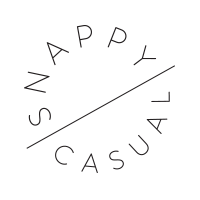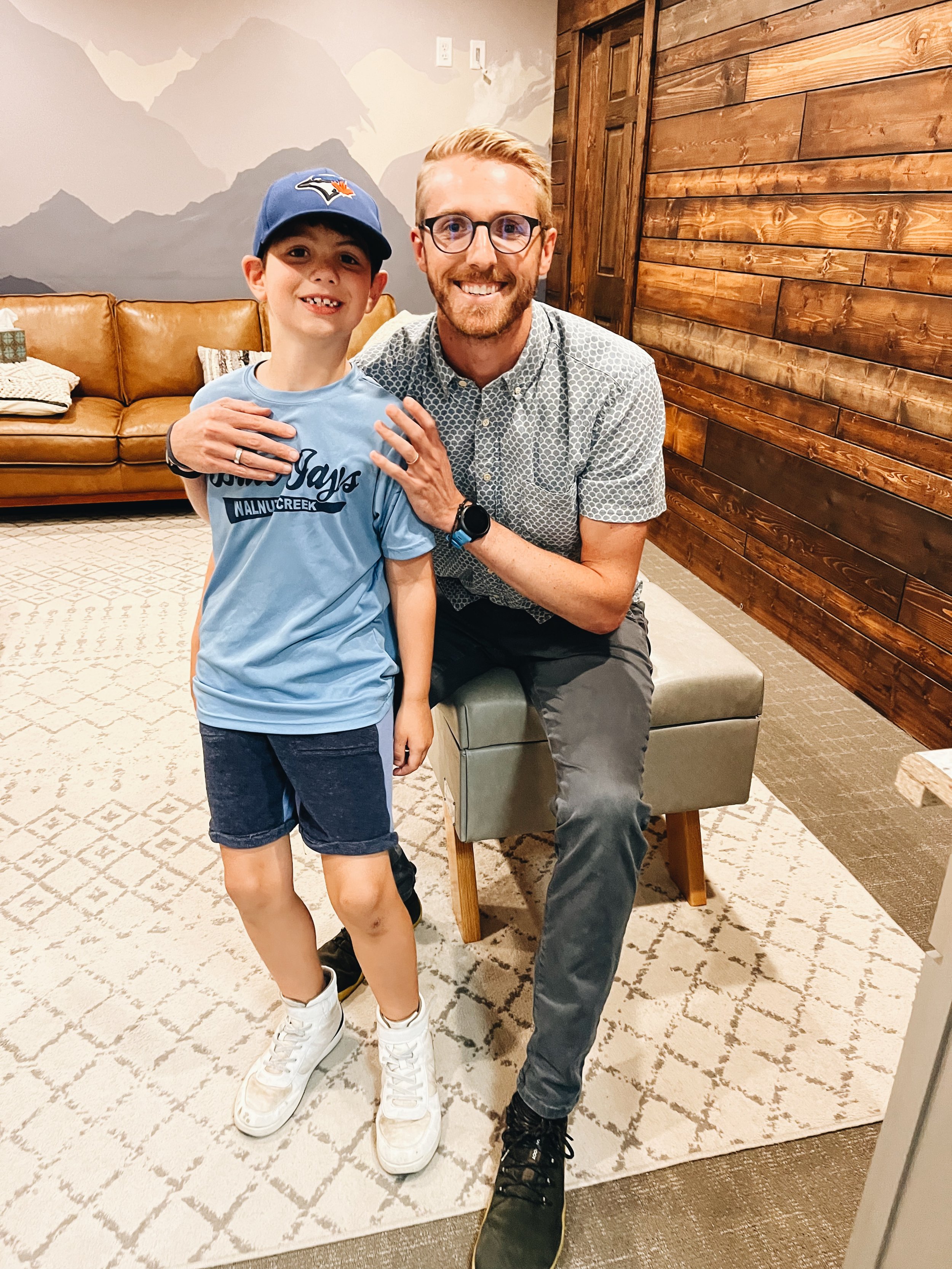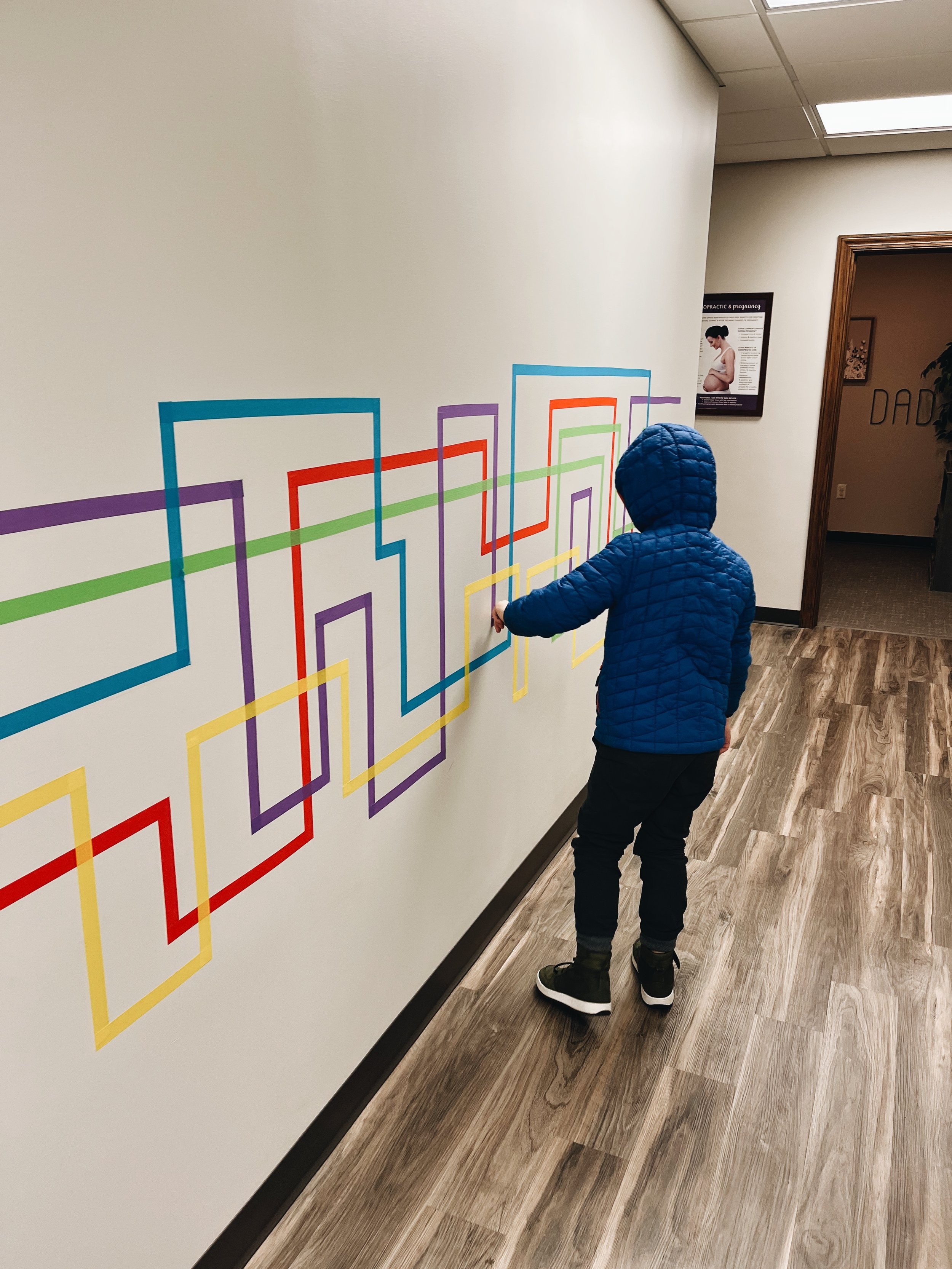Finch’s experience with functional neurology
Finch and Dr. Josh
Phew! Finch has been busy doing a lot of therapy this year! Where do I even start?!
Anyone who knows Finch knows that he is a special dude. Very funny, smart and energetic. He is the coolest kid. He has a lot of strengths. He also has challenges, just like all kids. For Finch, these look like:
FINCH’s SYMPTOMS
easily triggered anger and emotional outbursts (screaming in what seems out of nowhere, throwing punches)
hypersensitivity to touch, noise and smell (overstimulation)
difficulties adapting to change (clothing, seat belts, shoes, etc.)
bedwetting past age 5
poor short-term memory (he “forgets” a lot)
difficulties in social situations (if there is another child crying, I bet my child was involved)
impulsivity (doesn’t think things through before acting)
lack of spatial awareness (running into other people)
Some of these are certainly “normal” for a kid his age (he was 6 at the time). Our pediatrician (who we love) said she wouldn’t be overly concerned with any of these things until he was in second grade. That gave me comfort, as I have never wanted a misdiagnosis, but I also have never wanted to be in denial or to not help him reach his potential if there was something more we could do for him.
His home life is OK, but the hardest times are when he is at school. The school environment is difficult for him. It started when he was in 3-year-old preschool. We did transitional kindergarten to give him an extra year to mature before going to school, but his kindergarten year was still pretty rough. We had explored a lot of avenues of care for him over the three years up to this point. We did AEA evaluations, hearing tests, allergy testing (he’s only allergic to cats), an ENT checkup (his tonsils looked fine, and they didn’t think a sleep study would be the right next step) … it seemed like we kept hitting dead ends.
I felt like no one could see what Eric and I (and his teachers) saw … that something bigger was going on. It got to the point where it was starting to affect his self image (thinking he was a bad kid because he gets in trouble often) and relationships with peers (other kids not wanting to play with him, thinking he is a bad kid because of how often he’s in the principal’s office). It was heartbreaking!
My next thought was play therapy, but the place I wanted to get him into was full. Another dead end.
Then I heard about Infinity Functional Neurology from a friend, and I am so thankful I did. It has helped me understand Finch so much better. It truly changed our lives!
FUNCTIONAL NEUROLOGY
Functional neurology is an approach to treating neurological disorders that evaluates the nervous system and its function. While medical neurologists treat through medication, functional neurologists treat through brain exercises and specific adjustments.
In January we had our first visit and consultation. Dr. Josh tested Finch for primitive reflexes — things he should have outgrown at 6-9 months of age. Finch failed every test except for one (balance). He seemed to be stuck in fight or flight. Watching him do the testing made me want to cry for him. He was clearly trying so hard, but his body wasn’t cooperating. He would fatigue out. I had never seen it so clearly before. It really helped me sympathize with him and understand why he must have so much trouble at school at carpet time. Dr. Josh seemed surprised that Finch could read, write and catch a ball with how poorly his brain and eyes seemed to be working.
Why is Finch like this? We don’t know. It could have been a concussion at a young age, complications during my pregnancy, or some other unknown reason. Finch never really crawled, which could have been an early indicator. (Crawling is very good for the brain!)
For the first time in a long time, I felt like someone could see what we were talking about and had ideas to help. I finally felt like we were on the right path! When you feel like your child is a handful in most settings for other people, it is a breath of fresh air to be surrounded by people who appreciate your child for their differences.
It is actually crazy wonderful the peace we feel in the office. I feel so lucky we have this resource just five minutes from our house. We have met some very special people and Finch actually looks forward to going to his appointments, which is a miracle in itself.
TREATMENT
The first step was to remove gluten for two weeks in case that was causing brain inflammation. Dr. Josh said a lot of kids with Finch’s symptoms are sensitive to gluten. We eventually did a food sensitivity test (blood draw) and it revealed that he is, in fact, sensitive to gluten. Finch has done great with the diet change!
Finch attended two appointments a week for chiropractic adjustments and different rehabilitation exercises. We tested him for autoimmune diseases and discovered his body was fighting a handful of infections (including herpes and mono). We did homeopathic treatments for several weeks to combat those. He began doing daily exercises at home every morning (similar to yoga). In-office therapies include low level laser therapy, neurosage, rock climbing and video games that activate the right side of his brain.
After two months, Finch’s primitive reflexes were gone! In July, after seven months of biweekly therapy, he graduated! I cried. I was shocked, relieved and so proud of him.
WHERE WE GO FROM HERE
He has come a long way! He no longer rips his clothes off when he comes in the house, he actually enjoys amusement park rides, he freaks out a lot less with loud noises and there is less screaming. But, we can tell there is still more work to be done. His primitive reflexes are gone, but sometimes when you are stuck in fight or flight for that long you can develop tunnel vision.
Dr. Josh referred us to an eye doctor after not seeing a ton of improvement in that area. Finch recently got performance glasses and will begin vision therapy this fall.
Finch has an IEP at school for aggression: I love knowing he has the support he needs during the day.
I have wondered about removing food dyes, but haven’t made that leap yet.
He still wets the bed, which honestly is the least of our problems, and I wonder if he has sleep apnea, so I may explore that a bit further before ruling it out. I don’t think his brain “turns off” when he sleeps.
One thing is for sure: We love our little Finchy-dude and all his special quirks and don’t want any of them to go away! We just want him to be calmer, more comfortable and happy!
Over the past several months I’ve gotten several questions about Finch’s experience with his therapies. I am an open book and more than willing to answer any specific questions you may have!








